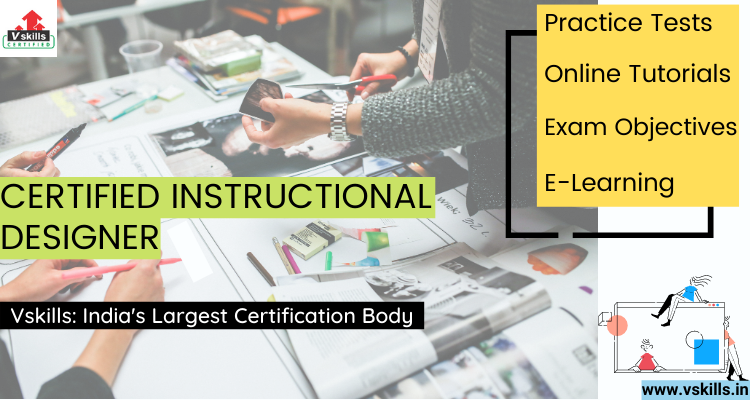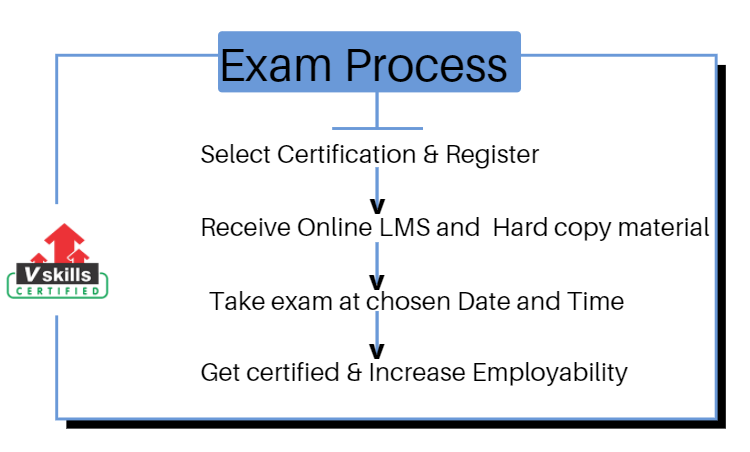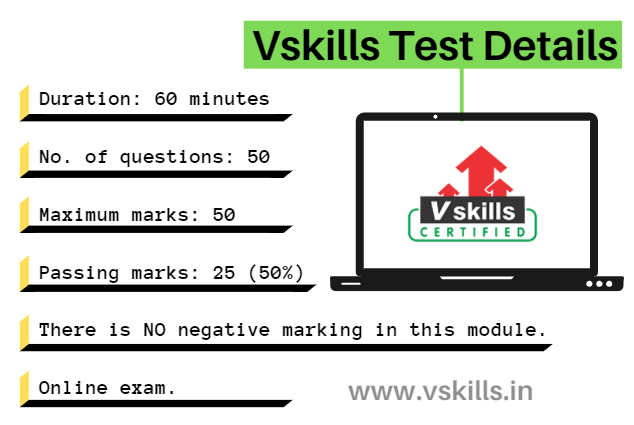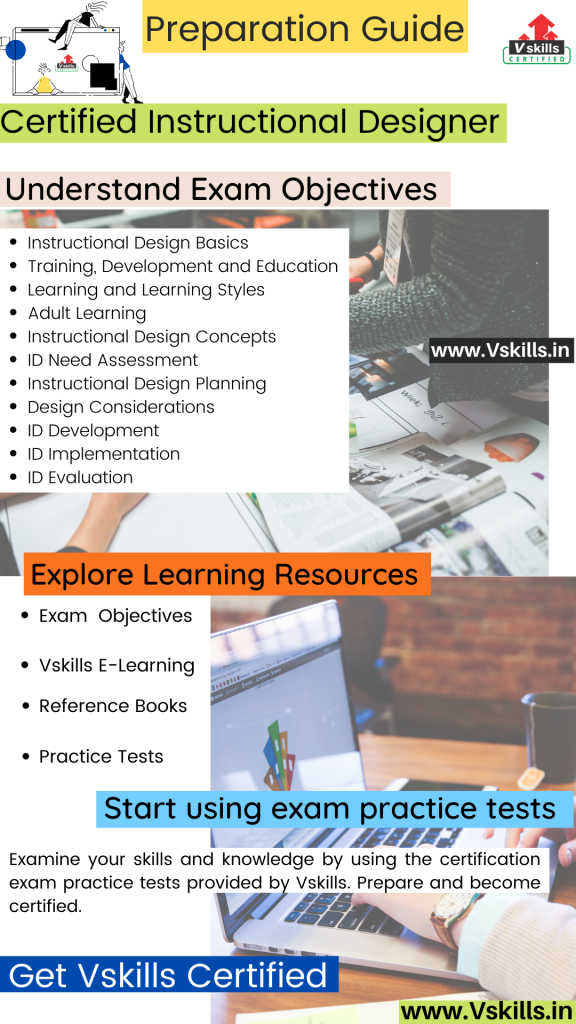
An instructional designer is a professional who has the ability to identify the performance, skills, information, and attitude gaps of a targeted audience. They are responsible for creating, selecting, and suggesting learning experiences. They work with subject matter experts as well as identify the target audience’s training requirements. Further, they also visualize instructional graphics, the user interface, and the finished product. They are responsible for conducting instructional research and analysis of learners and contexts. Lastly, they also have the ability to apply tested instructional design theories, practice, and methods.
So, let’s get started with the in-depth details and resources to become a Certified Instructional Designer.
Vskills Certified Instructional Designer
Instructional design basically involves designing, developing, and delivering learning experiences, in digital or physical format. And, in this field, huge opportunities are available for instructional designers with increased relevance of learning in corporate as well as educational environments. However, the Vskills Instructional Designer certification course will help candidates to understand the basics, principles and tools of instructional design as well as it will also cover augmented and virtual reality. Moreover, this certification is best for content developers, instructional designers, curriculum producers, learning managers, and courseware developers.

Vskills certification providers give candidates access to top exams as well as provides exam benefits. This includes:
- The certifications will have a Government verification tag.
- The Certification is valid for life.
- Candidates will get lifelong e-learning access.
- Access to free Practice Tests.
- Candidates will get tagged as ‘Vskills Certified’ On Monsterindia.com and ‘Vskills Certified’ On Shine Shine.com.

Course Outline
Certified Instructional Designer covers the following topics –
Instructional Design Basics
- Learning process
- Evolution of ID
- Instructional Designer Role and Skills
- Instructional Strategies
Training, Development and Education
- Introduction
- Objectives of Training
- Areas of Training
- Training Drawbacks
- Benefits of Training
- Need for Training
- Types of Training
- Training Risks
- Difference between training, education & development
- Role of T&D in HRD
Learning and Learning Styles
- What is learning?
- Learning Styles
- The Three Representational Modes (TRiM)
- Self, Met cognition, Cognition, Knowledge (SMCK)
- Other Supporting Theories
- Adult Learning
- Principles of Training
- Student Types
Adult Learning
- Principles of Adult Learning
- Characteristics of Adult Learners
- Applying Adult Learning Theory
- Learning Principles
- Retention and Recall
- Concentration and Attention Span
- Cardinal Rules of Memory
- Learning Styles Continuum
Instructional Design Concepts
- Keller’s ARCS Model of Motivation
- Knowles’ Theory of Andragogy
- Bloom’s Taxonomy
- Gagne’s Nine Events of Instruction
- ADDIE Model
- Kirkpatrick Model
- The Cognitive Load Theory
- Dale’s Cone of Experience
- ROPES
ID Need Assessment
- Training Content for Different Categories of Employees
- Steps for Needs Assessment
- Rummler Brache Cause Analysis Model
- BARS
- TLO and ELO
Instructional Design Planning
- Project Stakeholders
- Developing Project Charter
- Project Scoping
- Project Budgeting
- Project Feasibility
- Estimation Tools and Techniques
- Project Appraisal
- Handling Project Risk
Design Considerations
- Modular Design
- Cultural Issues
- Reducing course length
- Reigeluth Elaboration Theory
- SQR3 technique
- ARCS Model
- Selecting and Prioritizing course content
- Preparing the design document
ID Development
- Developing for different audience
- Developing effective, efficient and engaging content
- Using Interactive Media
- Sequencing course content
- Storyboarding
- Develop Training Aids
- Templating
ID Implementation
- Course Validation
- Preparing Check list for implementation
- Selecting Implementation mode
- E-learning
- Technical Compliance
- Meeting Readability and Accessibility
ID Evaluation
- Evaluating Techniques
- Measure Learning
- Evaluate Learner Satisfaction
- Measuring Learner’s Improvement
Advanced Topics
- ID Software and Web Tools
- Digital Narrative
- Agile Instructional Design
- ID and Virtual Reality
- ID and Augmented Reality
Preparation Guide for Vskills Certified Instructional Designer
It is essential to gather all the study resources before starting to prepare for the certification exam. This is necessary so that candidates do not face any difficulty in researching the contents and topics. As without having the study resources candidates will face difficulty to understand the concepts. However, for Certified Instructional Designer, below there are resources provided by Vskills that will help candidates to cover all the concepts and prepare well for the exam.

Exam Objectives
Exam objectives are important as it provides brief about the exam by diving the syllabus into topics that include various sections and subsections. Candidates should get all the content and topics related to the exam. As it provides a benefit to candidates to understand better during the preparation time. Doing this will help them to understand things more accurately. For Certified Instructional Designer the topics include –
- Instructional Design Basics
- Training, Development, and Education
- Learning and Learning Styles
- Adult Learning
- Instructional Design Concepts
- ID Need Assessment
- Instructional Design Planning
- Design Considerations
- ID Development
- ID Implementation
- ID Evaluation
Vskills E-Learning
With E-learning for Vskills Certified Instructional Designer, candidates will get a better understanding of the content using the online learning material for a lifetime. Moreover, Vskills provides hard copy material that will help them in improving skills and staying up to date with the learning curve for getting better opportunities.
Books for Reference
Candidates should start taking help from reference books for understanding concepts and topics fastly. However, for the Certified Instructional Designer exam, there are various books available which you can find online or in libraries. Some of the books are as follows:
- Design for How People Learn book by Julie Dirksen
- Instructional Design for ELearning Book by Marina Arshavskiy
Evaluate yourself with Practice Test
Practice tests play a crucial role at the time of exam preparation. This will helps candidates to improve their answering skills as well as helps in finding out the weak areas. Moreover, by assessing themselves candidates will get a clear view of their preparation and then start working on it accordingly. So, start practicing for the exam and get certified.



